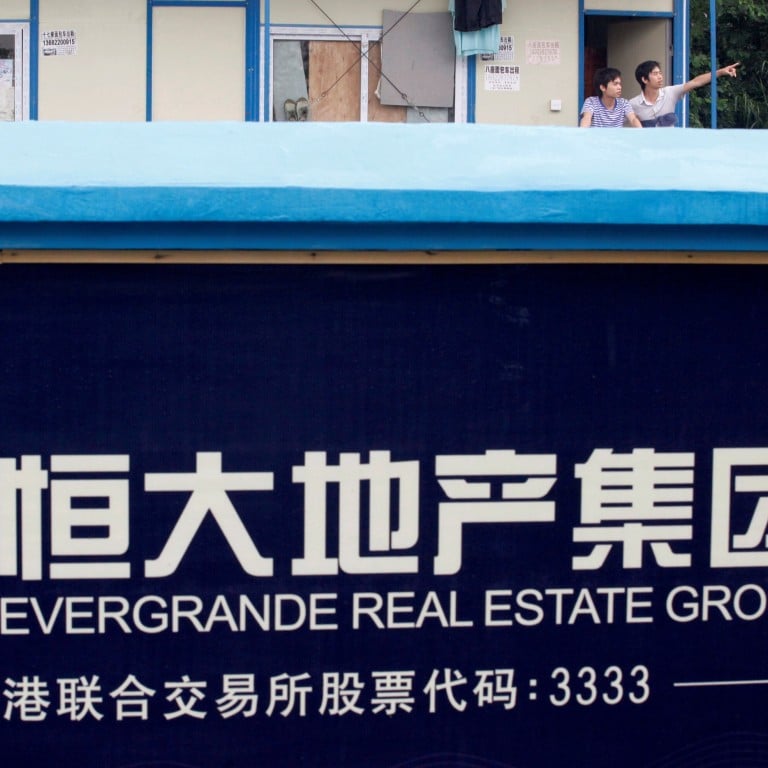
Dealing with debt: a time line of how Hui Ka-yan’s Evergrande landed back in crisis mode with the world’s heaviest debt load
- The clock is ticking for China’s most indebted property developer to find its way out of a looming credit crunch
- In August alone, China Evergrande Group has endured multiple credit-rating downgrades that sent its stock and bonds tumbling
This month alone, China Evergrande Group has endured multiple credit-rating downgrades that sent its stock and bonds tumbling, only to see them recover briefly after it confirmed talks to sell some prized assets and as creditors extended liquidity relief to help it pay overdue bills.
Here’s a look at other key events over the past few months that have sent Evergrande investors on a wild ride:
August 12
China’s central government instructed authorities in Guangdong province to map out a plan to manage Evergrande’s debt problems. At least three major creditors agreed to give the developer extensions on some project loans.
August 11
At HengTen Networks Group, Evergrande’s internet service arm, Ke Liming took over from Xu Wen as chairman. Xu, a former executive at Evergrande, served as HengTen’s chairman since April 2017. Evergrande raised US$418 million selling a stake in the business just days earlier.
August 10:
Evergrande confirmed it’s in talks to sell assets including stakes in its new-energy vehicle and property units, boosting the stock by more than 7 per cent. Country Garden Holdings’ property management arm is among several potential buyers for assets of the services unit, Caixin reported. Two days later, Cailian reported that Country Garden and rival China Vanke were no longer interested.
August 5:
S&P Global Ratings downgraded Evergrande by two levels to “CCC”, just four notches above the designation for defaulted borrowers. Lawsuits stemming from overdue bills at Evergrande and its affiliates will be centralised in a Guangzhou court, Caixin reported, citing lawyers.
August 3::
Moody’s Investors Service lowered the credit rating by two notches to “Caa1”, with a negative outlook. An advertiser sought legal action for payments, asking a Shenzhen court to freeze some assets of an Evergrande unit, including bank accounts.
July 30:
Lanzhou City said the developer’s affiliates owe the north-western city money for land. The 20 per cent stake in Shanghai-listed Langfang Development, held by the developer’s main onshore unit, was frozen for three years.
July 28:
Huaibei Mining Holdings filed a lawsuit against Evergrande in Anhui province, alleging a unit of the company missed payments. Fitch downgraded Evergrande and its subsidiaries to “CCC+” from “B”, reflecting its “diminishing margin of safety in preserving liquidity.” China’s largest credit risk assessor China Chengxin International Credit Rating revises Evergrande’s outlook to negative.
July 27:
Evergrande made a surprise decision against declaring a special dividend less than two weeks after flagging it to investors.
July 23:
HSBC and Bank of China in Hong Kong reconsidered their decisions to halt mortgages to Evergrande’s unfinished projects, after their moves were questioned by the city’s de facto central bank.
July 22::
China Guangfa Bank successfully asked a local court to freeze a 132 million yuan (US$20 million) deposit held by Evergrande’s main onshore subsidiary. Evergrande resolved a dispute with Guangfa days later.
July 21:
HSBC, Bank of China’s Hong Kong unit and at least two other major lenders stopped providing mortgages to buyers of China Evergrande Group’s unfinished residential properties in Hong Kong, Bloomberg reported.
July 20:
The city of Shaoyang halted sales at two of Evergrande’s residential projects, saying Evergrande didn’t deposit enough presale funds into escrow accounts and intentionally evaded supervision. The city retreated the halt the next day.
July 9::
China’s top financial regulator, the Financial Stability and Development Committee, urged founder Hui Ka-yan to solve his company’s debt problems as quickly as possible, Bloomberg reported.
June 30:
Evergrande said it has met a key debt metric required by regulators, after reducing its net debt-to-equity ratio, or net gearing, to below 100 per cent. The company’s total debt declined to about 570 billion yuan in late June from 717 billion yuan in December.
June 22::
Three banks with a combined 46 billion yuan of credit exposure to Evergrande as of June 2020 decided not to renew loans to the company when they mature this year, Bloomberg reported.
June 8::
Chinese regulators instructed major creditors of Evergrande to conduct a fresh round of stress tests on their exposures.
May 27::
China’s banking regulator is examining more than 100 billion yuan (US$15.7 billion) of transactions between the developer and Shengjing Bank, Caixin Media’s WeNews reported. Shengjing holds large amounts of bonds issued by Evergrande, WeNews said. Evergrande is the bank’s biggest shareholder.

